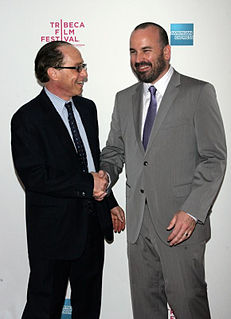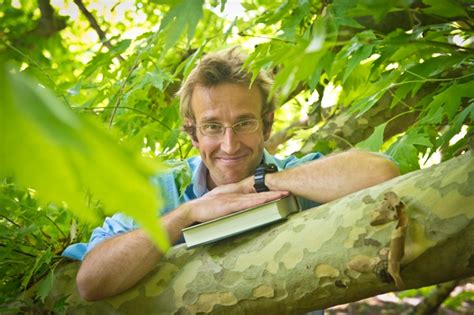A Quote by Antoine de Saint-Exupery
When we think that the machine will harm man, then it is perhaps because we are not yet capable of judging the rapid changes it has brought about. We hardly feel at home in this landscape of mines and power stations. We have just moved into this new home that we have not even finished yet. Everything around us has changed so fast - personal relations, working conditions, habits. Even our state of mind is in turmoil.
Quote Topics
About
Around
Because
Brought
Capable
Changed
Changes
Conditions
Even
Everything
Fast
Feel
Finished
Habits
Hardly
Harm
Home
Judging
Just
Landscape
Machine
Man
Mind
Mines
Moved
New
New Home
Our
Perhaps
Personal
Power
Rapid
Rapid Change
Relations
State
State Of Mind
Stations
Then
Think
Turmoil
Us
Will
Working
Working Conditions
Related Quotes
We travel because we need to, because distance and difference are the secret tonic of creativity. When we get home, home is still the same. But something in our mind has been changed, and that changes everything. Several new science papers suggest that getting away is an essential habit of effective thinking. When we escape from the place we spend most of our time, the mind is suddenly made aware of all those errant ideas we'd previously suppressed. We start thinking about obscure possibilitiebsthat never would have occurred to us if we'd stayed home.
These days, more than any other time, we are worried about our personal life, our private life. When we talk about our private life, it means our home, our body even. It seems that when we want to have calmness in this world, we make a wall around us. This gives us a very calm environment, and when we feel that somebody is intruding into that, it makes us very angry and we feel we have to do something about it.
If a beach-head of cooperation may push back the jungle of suspicion, let both sides join in creating a new endeavor, not a new balance of power, but a new world of law, where the strong are just and the weak secure and the peace preserved. All this will not be finished in the first one hundred days. Nor will it be finished in the first one thousand days, nor in the life of this Administration, nor even perhaps in our lifetime on this planet. But let us begin.
I just moved into a new house, so I love spending time at home. Everything for me is all about self-care because I really feel that if I'm at my best, than I'm able to come to my job and really be feeling the best, so if I'm not working out or going on a hike, than I'm at home recharging and cooking dinner and hanging out with my cat.
God Himself - His thoughts, His will, His love, His judgments are men's home. To think His thoughts, to choose His will, to judge His judgments, and thus to know that He is in us, with us, is to be at home. And to pass through the valley of the shadow of death is the way home, but only thus, that as all changes have hitherto led us nearer to this home, the knowledge of God, so this greatest of all outward changes - for it is but an outward change - will surely usher us into a region where there will be fresh possibilities of drawing nigh in heart, soul, and mind to the Father of us all.
Take the Long Way Home is a song that I wrote that's on two levels - on one level I'm talking about not wanting to go home to the wife, 'take the long way home' because she treats you like part of the furniture. But there's a deeper level to the song, too. I really believe we all want to find our true home, find that place in us where we feel at home, and to me, home is in the heart. When we’re in touch with our heart and we're living our life from our heart, then we do feel like we found our home.
The aggressive incoherence of our common surroundings can be described as entropy made visible. The way we have disposed things on the landscape leads us in the direction of disorder and death. They are categorically evil. These dispositions are destroying our only home-planet and other organisms that share it. They defeat our need to care about where we are and the things in place there. They prompt us to feel that civilization is not worth carrying on. They rob us of our identity and our will to live. These things are not about personal taste or style.
Sometimes a child will get lucky and be placed with foster parents who are loving and supportive and who consider that child their own. But for many, that doesn't happen. Kids are moved around from home to home, to group home and institutions, until they are 18, when they are considered adults and the system is finished with them.
The management of foreign relations appears to be the most susceptible of abuse of all the trusts committed to a Government, because they can be concealed or disclosed, or disclosed in such parts and at such times as will best suit particular views; and because the body of the people are less capable of judging, and are more under the influence of prejudices, on that branch of their affairs, than of any other. Perhaps it is a universal truth that the loss of liberty at home is to be charged to provisions against danger, real or pretended, from abroad.
The parent-child relationship in the home usually reflects the objective cultural conditions of the surrounding social structure. If the conditions which penetrate the home are authoritarian, rigid, and dominating, the home will increase the climate of oppression. As these authoritarian relations between parents and children intensify, children in their infancy increasingly internalize the paternal authority.
So let's not pretend that travel is always fun. We don't spend 10 hours lost in the Louvre because we like it, and the view from the top of Machu Picchu probably doesn't make up for the hassle of lost luggage. (More often than not, I need a holiday after my holiday.) We travel because we need to, because distance and difference are the secret tonic of creativity. When we get home, home is still the same. But something in our mind has been changed, and that changes everything.




































